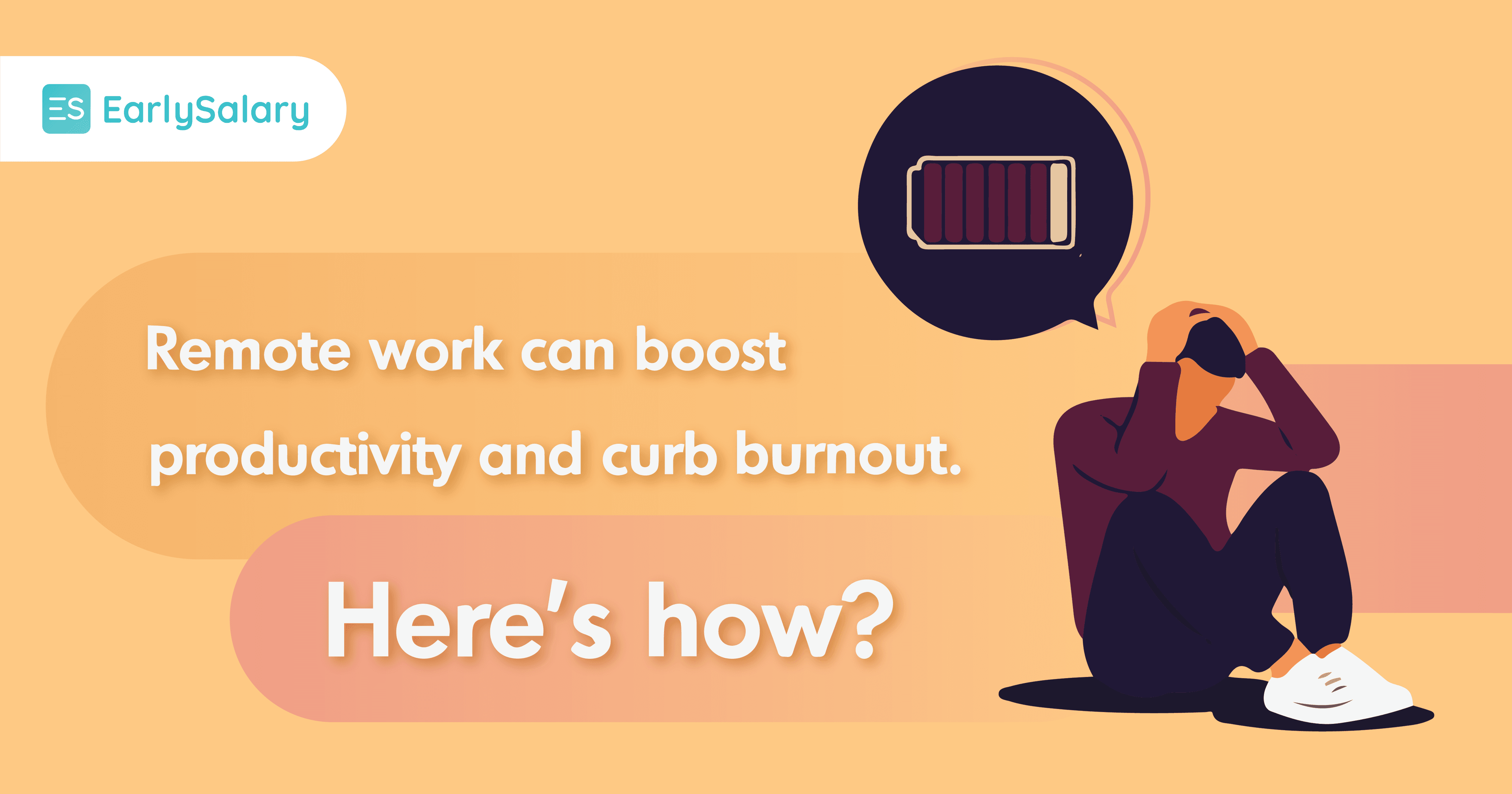Remote Work Can Boost Productivity And Curb Burnout. Here’s How
Reviewed by: Fibe Research Team
- Updated on: 10 Apr 2023

Highlight: The introduction of remote work in the workspace was not the easiest to adapt to. But it looks like it has some promising benefits to offer.
Before the pandemic hit us, if you told any manager that they should allow their employees to work from home for the entire month, they would probably laugh it off. As popular belief would have it, people thought you can’t possibly reward the work of someone who works remotely equally as someone who spends his time in office.
Especially in a South-Asian work setup like ours, where people believe in the hustle culture so much that to earn success you must spend your blood and sweat. This is the reason why freelancing and other remote work options were often frowned upon by the Indian population.
Then came the pandemic and brought with it a paradigm shift in the way we perceive workspace and work in general. The new remote work culture or as corporates call it these days, work-from-home culture, has not been the easiest to adapt to. Overnight many workers were told to stay home, some lost employment because companies refused to pay the same amount of salary to a remote employee.
The remote work setup blurred the lines between work and life. However, after having adapted to the remote work setup over the past year, people are showing keen interest in this setup, and looks like it is here to stay even after we bid farewell to this pandemic.
As the remote work culture completes almost two years, the future of the work paradigm shift continues to accelerate. Remote working options are proving to be more sustainable, humane, and equitable which might suggest that it is here to stay long after the pandemic leaves.
Also Read: Bolstering Financial Wellness Programs for Remote Employees
Table of Contents
How is the remote work culture is helping employees?

Remote work appears to be the way of the future as many employees state that they prefer working remotely at least some of the time if not all. This could be due to the factors mentioned below.
#1 Alleviate Employee Burnout
Widespread workplace burnout is one of the evils of the growing corporate culture. This is because corporations strive for a hustle culture and thus give very little regard to the emotional, physical, and mental wellbeing of their employees. However, this changed during the pandemic.
A report by Catalyst.org showed that offering remote work options lowers employee burnout rate to a significant level. Added to this, if empathy is practised by the respective managers, employees experience a further drop in the rate of burnout.
Source: https://www.catalyst.org/reports/remote-work-burnout-productivity/
#2 Increased Innovation
The same Catalyst report also pointed out that employees were 63% more likely to report often and perform innovatively in the workspace when they were offered remote working.
Creativity and innovation are important in the office because it gives corporations an advantage in permeating markets faster and procures a better relationship with emerging markets, which can lead to greater opportunities, especially in rich countries.
#3 Increased Work Engagement
The report shows that Employees are 75% more likely to show up or always be engaged with the company. It also states that remote work strengthens the organisational commitment of an employee. When offered remote-working, employees showed 68% enhanced organisational commitment. Both these qualities can be of extreme importance to a company.
This is because while a greater engagement of the employee ensures better and faster results on projects, organisational commitment ensures the overall loyalty of an employee towards the company.
Some extra benefits of remote work

In addition to the above qualities, remote work also proved to be beneficial for working women who have child-rearing responsibilities. Due to the availability of remote work women now do not have to choose between having a home and focussing on their careers. This factor is responsible for 32% of women being less likely to leave the job for maternity leave.
In fact, due to the factors represented above, there has been a 30% fall in the number of people likely to leave their jobs in total. Apart from the above benefits to the companies, remote work also provides employees with an ability to control their workspace, save time and money on commutation, higher autonomy and less office intervention. It also helps them reduce their carbon footprint.
Conclusion
Looking at the advantages above, it is no shock that the world is accepting remote working with open arms. Even as offices gear up to open in a phased manner, opting between an in-office work setup and remote work has now become a choice, unlike the norm of a conventional workspace as it used to be before the pandemic.
Download the personal loan app here, or simply log in to our website and be a part of the #OneSmallStep experience.
